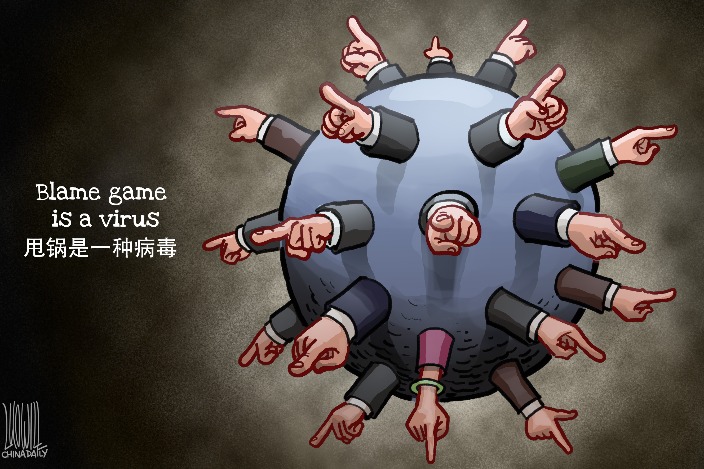US needs to move away from its blame-China trajectory


Like many countries around the world, the United States is currently experiencing unprecedented upheaval as a result of the coronavirus pandemic. Much of the national conversation has focused on the US government’s unvarnished attempts to characterize China as the villain in a global morality play with the coronavirus as the main character.
The purpose of this morality play is to fashion a convenient scapegoat for the US government’s failure to contain the virus and up to this point in time it has effectively served to distract large sections of the American public who otherwise would have reason to question why the US death toll from the virus has overtaken Italy’s, with over half a million cases of infection and over 20,000 fatalities at the time of writing.
Various states throughout the country are fighting with each other over scarce supplies, ethnic minorities are suffering disproportionately as a result of unaffordable healthcare for many uninsured Americans, a lack of centralized coordination and conflicting messages about social distancing has brought chaos to many communities from coast to coast. Scapegoating China is not only disingenuous but it can only heighten the geopolitical tensions already existing between the two countries.
It is well known that China and the United States are the most powerful countries in the world, resulting in fierce global competition and, more recently, intensified feelings of mistrust, especially as national borders are being shut down in an attempt to fight the spread of the coronavirus. While the antagonism directed at China, which was on display during the recent trade war between the two countries was unnecessarily contentious and designed to make the US appear like a tough negotiator to its citizens, it served little constructive purpose other than an exercise in economic saber-rattling.
Similarly, the recent criticism of China by the US administration concerning the coronavirus signaled a missed opportunity to improve the relationship between the two countries and has only exacerbated the political drama in a political arena where people’s lives are at risk and cooperation and reciprocity is most needed.
China’s success in containing the virus has been contrasted with the less successful attempts by the United States, much to the chagrin of the US leadership. This has provoked the US administration to retaliate against China and to try to blame China for whatever missteps were taken by Washington during the early days of the outbreak of the virus. The continued intensification of criticism of China by the United States has made it clear that we also live in a world of competition for digital geographies.
American networked communities in the blogosphere and social media have followed closely the US administration’s attempt to deflect the blame away from its failings by maintaining that China must bear responsibility for unleashing the virus onto the world. This resulted in members of the US administration referring to the coronavirus as the "China virus," and ignoring the fact that viruses know no borders. Conspiracy theories —essentially maintaining that the virus was man-made— abound both in the US and in China with critics claiming that each other is responsible for creating the virus.
These theories have no basis in fact and have no place in rational dialogue. And in the United States, criticisms of China by the US administration have resulted in racist attacks—both verbal and physical—on Chinese visitors and Chinese Americans. When the world is engaged in fighting a threatening pandemic, countries—even major competitors—must seize the opportunity to come together to build bridges of cooperation and foster mutual trust. The United States needs to move away from its blame-China trajectory and establish a co-partnership relationship with Beijing. Those of us in the field of education face an important task ahead of us: helping students to overcome their racial prejudices for the more laudable goal of creating communities of hope and possibility as part of their lifelong learning. Because prejudices tend to be ingrained over time, those who cling to their racist attitudes toward China or any other country outside of their national borders slowly become trapped inside their ideological prison, and even when those prison doors are opened by opportunities for dialogue and cooperation, they choose not to leave their prison cells because they remain unaware that their normalization of prejudice has placed them behind intractable iron bars. Hence, an important opportunity is missed to work collectively toward peace and prosperity throughout the world. Let’s not allow such a tragedy to be added to the already terrible costs of this pandemic.
Peter McLaren is a distinguished professor in Chapman University, US; Yan Wang is a researcher of the Paulo Freire Democratic Project, Chapman University.


































